#writeblr research
Explore tagged Tumblr posts
Text
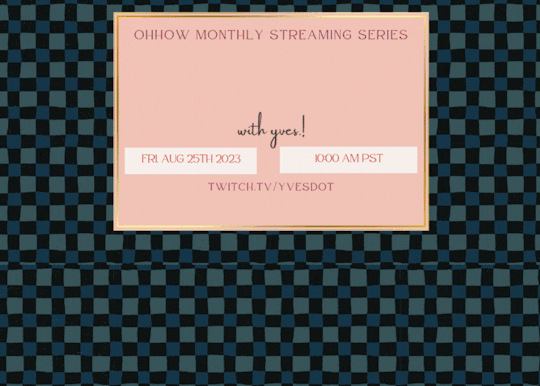
WRITING RESEARCH: BOOK COVERS
Friday, August 25th, 2023 @ 10:00 AM PST on Twitch
What's in a book cover? Join me as I hop through the biggest new releases on GoodReads and talk about what you can take away as both a reader and a writer. We'll be live about an hour touring some books I've never seen before to see whether I (and you!) can guess genre, tone, and more from a book cover alone. Thanks to OHHOW for sponsoring this one with the theme 'writing research'!
RECORDING AVAILABLE NOW
Bonus: I go full Kat Blaque on a Romance novel cover.
Support the author: all posted writing | book | ko-fi | Patreon
#txt#important writing updates#stream#twitch#writeblr stream#writeblr research#writing research#book covers#writeblr advice
34 notes
·
View notes
Text
writing tip: searching "[place of origin]ish names" will get you a lot of stuff and nonsense made up by baby bloggers.
searching "[place] census [year]" will get you lists of real names of real people who lived in that place.
#obviously not everywhere has a census or had one during the period you're writing in#but it's a better start than the goddamn baby bloggers#writeblr#writing research
38K notes
·
View notes
Text
🌙💙🤍
Unique English words for writing 2:
Opiate (v.) - To dull pain the way someone would with opioids/opium
Ecdysis (n.) - Shedding of the skin in reptiles, shedding of outer cuticle/exoskeleton in arthropods and insects
Clowder (n.) - A group of cats
Polypharmacy (n.) - Simultaneous use of multiple drugs to treat one or multiple conditions.
Sempiternal (adj.) - Everlasting, unchanging
Dwale (n.) - Belladonna / nightshade
Fleet (adj.) - (Of water) to be shallow
Opulence (n.) - A lot of wealth, luxuriousness
Sibilant (adj.) - Making a hissing sound
Sozzled (adj.) - To be very drunk
Incendiary (adj.) - Designed to create conflict
Chatoyant (adj.) - Having a changing luster/shine
Cessation (n.) - The process/fact of coming to an end or being brought to an end
Eventide (n.) - The end of the day, eve
Luculent (adj.) - Brightly shimmering
#for some words there are tons of meanings so I can't add them all but yk#🌙💙🤍#yyprompts#dialogue prompt#writeblr#writing ideas#writing reference#writing#writing resources#writing research#writing related#on writing#creative writing#writerscommunity#writing advice#writing tips#rare words
747 notes
·
View notes
Text
Naming International POC Characters: Do Your Research.
This post is part of a double feature for the same ask. First check out Mod Colette's answer to OP's original question at: A Careful Balance: Portraying a Black Character's Relationship with their Hair. Below are notes on character naming from Mod Rina.
~ ~ ~
@writingraccoon said:
My character is black in a dungeons and dragons-like fantasy world. His name is Kazuki Haile (pronounced hay-lee), and his mother is this world's equivalent of Japanese, which is where his first name is from, while his father is this world's equivalent of Ethiopian, which is where his last name is from. He looks much more like his father, and has hair type 4a. [...]
Hold on a sec.
Haile (pronounced hay-lee), [...] [H]is father is this world’s equivalent of Ethiopian, which is where his last name is from.
OP, where did you get this name? Behindthename.com, perhaps?

Note how it says, “Submitted names are contributed by users of this website. Check marks indicate the level to which a name has been verified.” Do you see any check marks, OP?
What language is this, by the way? If we only count official languages, Ethiopia has 5: Afar, Amharic, Oromo, Somali, & Tigrinya. If we count everything native to that region? Over 90 languages. And I haven't even mentioned the dormant/extinct ones. Do you know which language this name comes from? Have you determined Kazuki’s father’s ethnic group, religion, and language(s)? Do you know just how ethnically diverse Ethiopia is?
~ ~ ~
To All Looking for Character Names on the Internet:
Skip the name aggregators and baby name lists. They often do not cite their sources, even if they’re pulling from credible ones, and often copy each other.
If you still wish to use a name website, find a second source that isn’t a name website.
Find at least one real life individual, living or dead, who has this given name or surname. Try Wikipedia’s lists of notable individuals under "List of [ethnicity] people." You can even try searching Facebook! Pay attention to when these people were born for chronological accuracy/believability.
Make sure you know the language the name comes from, and the ethnicity/culture/religion it’s associated with.
Make sure you understand the naming practices of that culture—how many names, where they come from, name order, and other conventions.
Make sure you have the correct pronunciation of the name. Don’t always trust Wikipedia or American pronunciation guides on Youtube. Try to find a native speaker or language lesson source, or review the phonology & orthography and parse out the string one phoneme at a time.
Suggestions for web sources:
Wikipedia! Look for: “List of [language] [masculine/feminine] given names,” “List of most common [language] family names,” “List of most common surnames in [continent],” and "List of [ethnicity] people."
Census data! Harder to find due to language barriers & what governments make public, but these can really nail period accuracy. This may sound obvious, but look at the year of the character's birth, not the year your story takes place.
Forums and Reddit. No really. Multicultural couples and expats will often ask around for what to name their children. There’s also r/namenerds, where so many folks have shared names in their language that they now have “International Name Threads.” These are all great first-hand sources for name connotations—what’s trendy vs. old-fashioned, preppy vs. nerdy, or classic vs. overused vs. obscure.
~ ~ ~
Luckily for OP, I got very curious and did some research. More on Ethiopian & Eritrean naming, plus mixed/intercultural naming and my recommendations for this character, under the cut. It's really interesting, I promise!
Ethiopian and Eritrean Naming Practices
Haile (IPA: /həjlə/ roughly “hy-luh.” Both a & e are /ə/, a central “uh” sound) is a phrase meaning “power of” in Ge’ez, sometimes known as Classical Ethiopic, which is an extinct/dormant Semitic language that is now used as a liturgical language in Ethiopian churches (think of how Latin & Sanskrit are used today). So it's a religious name, and was likely popularized by the regnal name of the last emperor of Ethiopia, Haile Selassie (“Power of the Trinity”). Ironically, for these reasons it is about as nationalistically “Ethiopian” as a name can get.
Haile is one of the most common “surnames” ever in Ethiopia and Eritrea. Why was that in quotes? Because Ethiopians and Eritreans don’t have surnames. Historically, when they needed to distinguish themselves from others with the same given name, they affixed their father’s given name, and then sometimes their grandfather’s. In modern Ethiopia and Eritrea, their given name is followed by a parent’s (usually father’s) name. First-generation diaspora abroad may solidify this name into a legal “surname” which is then consistently passed down to subsequent generations.
Intercultural Marriages and Naming
This means that Kazuki’s parents will have to figure out if there will be a “surname” going forward, and who it applies to. Your easiest and most likely option is that Kazuki’s dad would have chosen to make his second name (Kazuki’s grandpa’s name) the legal “surname.” The mom would have taken this name upon marriage, and Kazuki would inherit it also. Either moving abroad or the circumstances of the intercultural marriage would have motivated this. Thus “Haile” would be grandpa’s name, and Kazuki wouldn’t be taking his “surname” from his dad. This prevents the mom & Kazuki from having different “surnames.” But you will have to understand and explain where the names came from and the decisions dad made to get there. Otherwise, this will ring culturally hollow and indicate a lack of research.
Typically intercultural parents try to
come up with a first name that is pronounceable in both languages,
go with a name that is the dominant language of where they live, or
compromise and pick one parent’s language, depending on the circumstances.
Option 1 and possibly 3 requires figuring out which language is the father’s first language. Unfortunately, because of the aforementioned national ubiquity of Haile, you will have to start from scratch here and figure out his ethnic group, religion (most are Ethiopian Orthodox and some Sunni Muslim), and language(s).
But then again, writing these characters knowledgeably and respectfully also requires figuring out that information anyway.
~ ~ ~
Names and naming practices are so, so diverse. Do research into the culture and language before picking a name, and never go with only one source.
~ Mod Rina
#asks#language#languages#linguistics#east africa#african#immigration#ethiopian#names#naming#research#resources#writeblr#character names#character name ideas#rina says read under the cut. read it
4K notes
·
View notes
Text
Online Writing Resources #2
Vocabulary:
Tip of My Tongue: I find this very helpful when I can't think of a specific word I'm looking for. Which is often.
WordHippo: As well as a thesaurus, this website also provides antonyms, definitions, rhymes, sentences that use a particular word, translations, pronunciations, and word forms.
OneLook: Find definitions, synonyms, antonyms, and related words. Allows you to search in specific categories.
YourDictionary: This website is a dictionary and thesaurus, and helps with grammar, vocabulary, and usage.
Information/Research:
Crime Reads: Covers crime and thriller movies, books, and TV shows. Great inspiration before writing a crime scene or story in this genre.
Havocscope: Black market information, including pricing, market value, and sources.
Climate Comparison: Compares the climates of two countries, or parts of the country, with each other.
Food Timeline: Centuries worth of information about food, and what people ate in different time periods.
Refseek: Information about literally anything. Provides links to other sources relevant to your search.
Perplexity AI: Uses information from the internet to answer any questions you have, summarises the key points, suggests relevant or similar searches, and links the sources used.
Planning/Worldbuilding:
One Stop for Writers: Literally everything a writer could need, all in one place: description thesaurus, character builder, story maps, scene maps, timelines, worldbuilding surveys, idea generators, templates, tutorials... all of it.
World Anvil: Provides worldbuilding templates and lets you create interactive maps, chronicles, timelines, whiteboards, family trees, charts, and interactive tables. May be a bit complicated to navigate at first, but the features are incredibly useful.
Inkarnate: This is a fantasy map maker where you can make maps for your world, regions, cities, interiors, or battles.
Miscellaneous:
750words: Helps build the habit of writing daily (about three pages). Fully private. It also tracks your progress and mindset while writing.
BetaBooks: Allows you to share your manuscript with your beta readers. You can see who is reading, how far they've read, and feedback.
Readable: Helps you to measure and improve the readability of your writing and make readers more engaged.
ZenPen: A minimalist writing page that blocks any distractions and helps improve your focus. You can make it full screen, invert the colours, and set a word count goal.
QueryTracker: Helps you find a literary agent for your book.
Lulu: Self-publish your book!
See my previous post with more:
Drop any other resources you like to use in the comments! Happy writing ❤
Previous | Next
#writeblr#writing#writing tips#writing advice#writing help#writing resources#creative writing#writer resources#author resources#writer stuff#how to write#writing techniques#story writing#author#author things#writer things#writer help#writing research#vocabulary#deception-united
2K notes
·
View notes
Text
Fantasy Guide to the Death of Monarchs

(no, unfortunately this is not a how to guide. Special Branch can now unhitch from outside my house)
To quote The Lion King... The Circle of Life. Monarchs are born, they live, they die. But what exactly happens when a monarch dies?
Dying

The monarch is on their deathbed. Their family, their friends, their advisers (their bit on the side sometimes) are lingering in the room or in the corridor. But of course, death isn't always expected. Usually, if the death is sudden, such as during a military campaign or an assassination, there is a scramble to preserve the news of the death for a time in order to make the necessary arrangements.
Causes of Death

"... Let us sit upon the ground. And tell sad stories of the death of kings; How some have been deposed; some slain in war, Some haunted by the ghosts they have deposed; Some poison'd by their wives: some sleeping kill'd; All murder'd," - William Shakespeare, Richard II.
Monarchs die like everybody else. They can die from anything. Disease (Alexander the Great), death at war (Richard I), assassination (Philip III of Macedonia), old age (Elizabeth II), starvation (Richard II), misuse of a hot poker (Edward II), murder at the hands of family (Edward V), childbirth (Jadwiga of Poland), accident (William of Orange... Pussy) , poison (Emperor Claudius) or on the toilet (George II). The death of a monarch is something at will be contested sometimes. If the body is not seen, there may be a belief that they live on. If the monarch dies suddenly, there may be rumours of foul play. No matter how a monarch dies, it will lead to uneasiness.
After Death
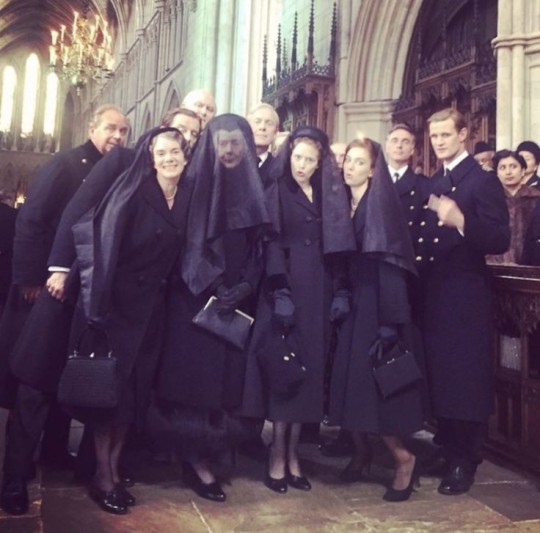
The steps after the monarch dies, usually include securing the next heir, proclaiming them to the people, and then working toward a clean succession. This time is delicate, it can be the breeding ground of coups and treacheries. Any claim other than the designated heir must be silenced by the proclaimation of the next sovereign as soon as possible. Child monarchs are extremely at risk during this period as the adults around them will seek to take custody of them. They who hold the monarch hold the power. It is imperative that the heir be notified at once so the stability of the kingdom can be assured.
The X is dead, Long Live the Next Guy

Once they breathe their last, all attention will turn to the next monarch or the scramble to find one. Be it by succession by blood or an election, the designated successor will immediately (even in the absence of a coronation) become the next monarch. Likely they will have been near their predecessor, either at their bedside or at least in shouting distance. But if they are away, they will quickly return to claim their throne. Without delay. Elizabeth II was actually on royal tour when she recieved news her father had died, leading to a hasty scramble back home.
When things don't go according to plan
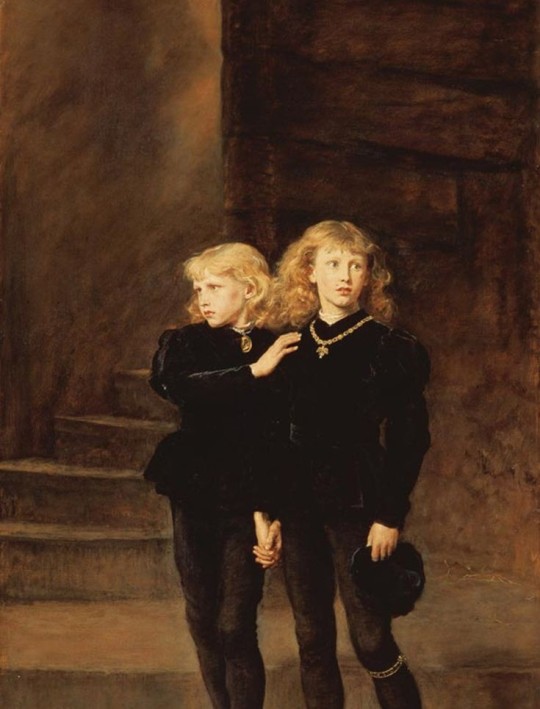
The monarch passes away. There are tears. Sometimes. There are sometimes coups as I mentioned. Young would be monarchs could be kidnapped, eg. Edward V. Another heir claims the throne instead of the designated heir, eg Lady Jane Grey and King Stephen. Monarchs who die on battlefields can have their bodies stolen (James IV of Scotland) or thrown into a ditch with their crown snatched (Richard III). The death of a monarch is a delicate time and dangerous for all royal family members. In some instances, it would lead to murder. If a son of a previous Ottoman Sultan wished to be the next Sultan, they would order the mass murder of their brothers upon their father's death - usually death by strangulation.
Funeral

The funeral of the monarch is something that is usually planned from day one. There would be some sort of plan in place for the funeral, the when, the where and the how. The monarch might know these plans but the upper rank of courtier and aides would know. Funerals would follow a certain pattern, likely adapting from previous funerals. They would be a public, a lavish ceremony that would see to the closure of businesses, entertainment venues, the arrival of foreign dignitaries and a long procession of the body surrounded by military forces, watched over by the grieving public. If they actually liked the monarch. Some deaths of Kings were met without any sadness such as George IV. There might also be lavish games thrown in the monarch's honour.
Mourning

Mourning is the period of time that the country, the court and royal family grieves publicly. It can last a week or so, like today. Or up to a year. In China, sometimes mourning lasted 3 years or more. Mourning period often came with strict rules about what one could do or dress in. In Edwardian times, there were stages in mourning. Full mourning could last up to a year, with women wearing black with very little ornament and widows covering their hair with bonnets of veils. Second mourning (6-9 months), women's clothes could be adorned with trimming and finally half mourning is the 3-6 month period where colour started to be reintroduced, restricted at first to greys and mauves. There would be no balls, no parties, no sporting during the deepest part of mourning.
#Fantasy Guide to death of a monarch#Death of Monarchs#writing#writeblr#writing resources#writing reference#writing advice#writer#spilled words#writer's problems#writer's life#Writing guide#Writer research#Writer resources#Royal funeral#Royalty#Royal#Royalty and nobility
404 notes
·
View notes
Text
Please keep writing dark twisted themes I want to read them pls pls don’t water it down to try to be less problematic that would make it boring I want to read it and go “Wow that sure is dark and twisted! Good thing its not real :))”
#writing#writeblr#g/t writing#whump writing#writing community#like yes ofc do your research and know what tropes are harmful when used in certain ways#but then go forth and write it#i don’t want people to be scared to post because of hateful comments#because I want to read the writing#post it for me#breezys post
280 notes
·
View notes
Text
Fantasy Worldbuilding Questions (News and Media)
News and Media Worldbuilding Questions:
What spreads information – newspapers, websites, pamphlets, word-of-mouth, a technologically advanced communications system?
What is considered newsworthy in this world?
Who owns each news platform (are they public or private, impartial or propagandistic/biased)?
Who are the public figures most often scrutinized in news networks (and why)?
Where do the most significant or newsworthy events happen in this world (and to where does their news reach)?
Where does the typical person go to find out what’s happening in their immediate community, or the wider world? Can they find this out?
When have investigative reports or rumor mills changed history, public sentiments or policies?
When do major news announcements or public addresses typically take place?
Why is the media either free, silenced or captured/biased?
Why might people in this world trust or distrust news media?
❯ ❯ ❯ Read other writing masterposts in this series: Worldbuilding Questions for Deeper Settings
#worldbuilding#writeblr#writing tips#writing advice#fwq#fiction writing#novel writing#writing#news and media#journalism#writing research#media ecosystem#news reach#information infrastructure#communication infrastructure
285 notes
·
View notes
Text
Write more characters with physical disabilities. Write more characters with mental disabilities. Write characters with neurodivergence (more than one specific type too). Write characters with mobility aids. Write characters who have good and bad health days. Write characters who are chronically in pain, but don't express it every second. Write characters who were born with a disability. Write characters who developed one. Write characters who have adapted to the world around them because the world won't adapt for them. Write about their strengths and weaknesses due to their disability. Write about accessibility. Write about inaccessibility. Make it realistic.
Don't make the disability magically disappear or be cured (or at least be mindful of how you write that). Don't make it their entire personality but also don't skip over it. Don't use stereotypes (and that's not just with disabilities). Don't make the character actively hate their disability; they're allowed to be upset but most people with disabilities have learned to accept it as part of their life and accept it as part of their identity.
#writeblr#writers on tumblr#writing advice#writing community#creative writing#if you don't know how research it#that's a huge part of writing#media representation#accessibility#disability representation#neurodiversity#disabled characters#writing disabilities#writing disabled characters
1K notes
·
View notes
Text
For people writing paralyzed Charles, here's some research I have done on living with spinal paralysis:
(disclaimer, this is all from research, and I may have gotten things wrong)
So from reading, paralysis is painful, even total spinal separation (which, from the movies, he likely didn't have entirely for two reasons 1) we see him move his legs very minimally (could just be actor error but still) 2) he moved his legs a bit before the bullet was removed, leading to the idea that Erik actually paralyzed him, meaning that it's quite possible the bullet didn't go further into the spine).
Even total spinal cord separation often allows sensations of pain in the legs, just not responsive to touch. This pain is phantom/nerve pain caused by nerve misfires. Nerve pain is usually a burning/sharp and specific pain (think hitting your funny bone x1000).
Because you're unable to move your legs entirely, in the morning, people often experience intensely painful muscle spasms and are dependent on muscle relaxers to prevent the spasming/shaking in the legs. This is from disrupted nerve signals and can be worsened by lack of bloodflow or movement. Because of this sometimes people with paralysis will try to move their legs around manually with their arms to prevent the spasms.
Because of these spasms, people with these injuries often strap their legs into their chair. This strapping in also prevents the legs from falling out of the chair/leg holds, which can be dangerous if there is no response to touch.
Charles had a very low spinal injury, most likely somewhere in the L4-L5 vertebral. The nervous system is like an upside-down tree, it branches out but does not go up, so anything above the sight of the wound is left unaffected, meaning Charles would likely have full range of motion of his entire abdomen.
Due to the location of the injury he would likely be able to use the bathroom on his own, but would do it with something called 'bladder training'. He could likely still feel body signals to use the restroom (not present with higher injuries).
Many people with this kind of injury will cover their legs with a blanket or wear baggy clothes for two reasons. firstly, aforementioned muscle spasms (they are NO JOKE), but also because muscle atrophy will occur due to lack of use and may lead to an 'uneven' appearance of the body.
There are also mental health issues that often come from these injuries. The permanence and lack of independence is a huge piece, and people often struggle with depression and lack of identity after injury. It's also not uncommon to struggle with opioid addiction due to the severe pain.
Paralysis lowers the body's immune system and causes a depletion of 'reserves' so to speak. Those with these injuries are much more prone to illness or infection because their body is already under stress. It doesn't actually lower the immune system like HIV would, but the stress on the body puts them at more risk.
Some good sources to learn more:
This video shows a man demonstrating how he gets out of bed in the morning with a healed lower spinal injury, and gives great reference for what spasms look like. His whole channel is super educational
This video shows how to get from the floor into a wheel chair. Again, fantastic youtube channel, good reference for writing wheelchair transfers.
These memoirs are all fantastic and real life accounts of what it is like to live with these injuries.
Now go on and write disabled Charles, armed with knowledge <3
#cherik#ao3#charles xavier#x men#erik lehnsherr#ao3 writer#fanfic#charles x erik#ao3 reader#x men headcannon#writing research#creative writing#writing#writers on tumblr#writeblr#spinalcordinjury#spinalhealth#spinalsupport#disability#disabled#cherik fanfic#marval fic#marvel#marvel cinematic universe#avengers#marvel movies#marvel mcu#mcu
104 notes
·
View notes
Text
FDSFDSPOIIUP[ ,MNNM,LKJ NM,,MNLMML DSIOPPOI SDDSASDDSAFDSSDF FDSKJLKNM,NM, P[JKLLKJFDSSDF (translation: "it's 1am and i've been proof-reading my thesis for the last hour and i want to die why am i such a control freak and perfectionist also i'm gonna cry at my thesis defense because wdym i didn't answer the research question it's literally all i did")
#writing#writeblr#studyblr#gradblr#thesis#academic life#phd life#college life#research#academia#proofreading#perfectionism#control freak#crying in the club#thesis defense#grad student struggles#study motivation#late night thoughts#burnout#academic writing
214 notes
·
View notes
Text
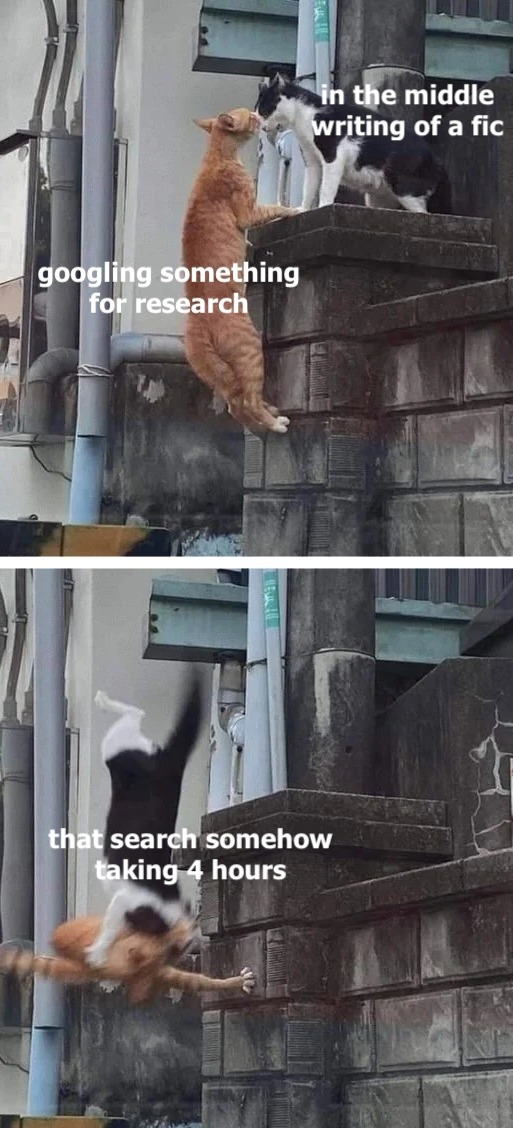
#google#don't trust google#google is deadly to writers#writer problems#fanfic problems#research rabbit hole#'imma google this real quick'#*four hours later*#what happened#fanfic#fanfic writer#writer#writer's problems#writeblr#writers of tumblr
1K notes
·
View notes
Text
WWC’s A Beginner’s Guide to Academic Research
We are pleased to present WWC’s A Beginner’s Guide to Academic Research!
This pandemic project has been over 2 years in the making and we hope it will greatly assist any of our readers who are eager to conduct in-depth research but may be at a loss where to start.
Go to the Guide Here
The guide is split into 6 parts:
Introduction and Table of Contents
Part 1: Getting Started
Part 2: Searching for Sources Online
Part 3: Evaluating Sources
Part 4: Navigating Academic Sources
Part 5: Recognizing Your Limits
Each portion of the guide has links to connect to the previous and next sections. While it is possible to view tumblr pages on phones and tablets through the app, we highly recommend viewing this guide via browser on desktop whenever possible. Tumblr page formatting is better suited for browsers and each section is very dense with information, which will make scrolling in the app or on your dashboard difficult.
Future FAQ/ Discussion:
As noted in part 5 of the guide, for the next two weeks, we will be keeping an eye on the notes for this post. If you have further questions or comments about academic research, drop them here and we will select the most pertinent to respond to in a later post.
If you find this guide helpful, we request that you consider tipping the moderators below for the work and time required from conception, to drafting, formatting and debugging. Their ko-fis are listed below:
Rina: https://ko-fi.com/arcanabean
Marika: https://ko-fi.com/5h1njuu
5K notes
·
View notes
Text
Sometimes, I’ll fact check a major plot point in my current WIP, panicking because I think I misunderstood a dumb, 19th century inheritance law. But I didn’t! I got it right! It’s like acing a test I didn’t deserve to ace!!
#writing#writeblr#writers on tumblr#thoughts while writing#fiction#author#books#writer#writing community#historical fiction#creative writing#writing a book#writing stuff#writers#writing and writers#write#writer thoughts#writerscommunity#victorian era#victorian#historical#history#writing and poetry#writing research#authors#writers and poets#writer stuff#writerblr#book#books and reading
113 notes
·
View notes
Text
How to Read a Scientific Article
THE THREE-PASS APPROACH
The key idea is that you should read the paper in up to 3 passes, instead of starting at the beginning and plowing your way to the end.
Each pass accomplishes specific goals and builds upon the previous pass:
The first pass gives you a general idea about the paper.
The second pass lets you grasp the paper’s content, but not its details.
The third pass helps you understand the paper in depth.
At the end of the first pass, you should be able to answer the 5 Cs:
Category: What type of paper is this? A measurement paper? An analysis of an existing system? A description of a research prototype?
Context: Which other papers is it related to? Which theoretical bases were used to analyze the problem?
Correctness: Do the assumptions appear to be valid?
Contributions: What are the paper’s main contributions?
Clarity: Is the paper well written?
Purpose of the Sections of Empirical Articles
Section — Use it for
Abstract — This is a great section to read to find out if the article will be relevant to your own research.
Introduction — This section gives you an overview of work that has been done on topics relating to the hypothesis of the article, and will often lead you to other relevant work that has been done in your area of interest.
Method — This section will help you understand the design of the experiment. This is particularly useful if you'd like to replicate the study.
Results — The results will tell you what the author/s found in the course of their experiment.
Discussion — The discussion section is typically easier to read than the method and results section, and it will help the reader understand the implications of the results of the experiment.
References — This is a great place to look to find articles that are related to the one you are reading. If you're looking to build your own literature review, the references are a great place to start.
The Anatomy of a Scientific Paper

Some initial guidelines for how to read a paper:
Read critically: Reading a research paper must be a critical process. You should not assume that the authors are always correct. Instead, be suspicious. Critical reading involves asking appropriate questions.
Read creatively: Reading a paper critically is easy, in that it is always easier to tear something down than to build it up. Reading creatively involves harder, more positive thinking.
Make notes as you read the paper. Use whatever style you prefer. If you have questions or criticisms, write them down so you do not forget them. Underline key points the authors make. Mark the data that is most important or that appears questionable. Such efforts help the first time you read a paper and pay big dividends when you have to re-read a paper after several months.
After the first read-through, try to summarize the paper in one or two sentence.
If possible, compare the paper to other works.
Write a review that includes:
a one or two sentence summary of the paper.
a deeper, more extensive outline of the main points of the paper, including for example assumptions made, arguments presented, data analyzed, and conclusions drawn.
any limitations or extensions you see for the ideas in the paper.
your opinion of the paper; primarily, the quality of the ideas and its potential impact.
The guide below details how to read a scientific article step-by-step.
First, you should not approach a scientific article like a textbook— reading from beginning to end of the chapter or book without pause for reflection or criticism. Additionally, it is highly recommended that you highlight and take notes as you move through the article.
Skim the article. This should only take you a few minutes. You are not trying to comprehend the entire article at this point, but just get a basic overview. You don’t have to read in order; the discussion/conclusions will help you to determine if the article is relevant to your research. You might then continue on to the Introduction. Pay attention to the structure of the article, headings, and figures.
Grasp the vocabulary. Begin to go through the article and highlight words and phrases you do not understand. Some words or phrases you may be able to get an understanding from the context in which it is used, but for others you may need the assistance of a medical or scientific dictionary. Subject-specific dictionaries available through our Library databases and online are listed below.
Identify the structure of the article and work on your comprehension. Most journals use an IMRD structure: An abstract followed by Introduction, Methods, Results, and Discussion. These sections typically contain conventional features, which you will start to recognize. If you learn to look for these features you will begin to read and comprehend the article more quickly.
Read the bibliography/references section. Reading the references or works cited may lead you to other useful resources. You might also get a better understanding of the basic terminology, main concepts, major researchers, and basic terminology in the area you are researching.
Reflect on what you have read and draw your own conclusions. As you are reading jot down any questions that come to mind. They may be answered later on in the article or you may have stumbled upon something that the authors did not consider. Here are some examples of questions you may ask yourself as you read:
Have I taken time to understand all the terminology?
Am I spending too much time on the less important parts of this article?
Do I have any reason to question the credibility of this research?
What specific problem does the research address and why is it important?
How do these results relate to my research interests or to other works which I have read?
6. Read the article a second time in chronological order. Reading the article a second time will reinforce your overall understanding. You may even start to make connections to other articles that you have read on this topic.
Identify Key Information
Whether you are looking for information that supports the hypothesis in your own paper or carefully analyzing the article and critiquing the research methods or findings, there are important questions that you should answer as you read the article.
What is the main hypothesis?
Why is this research important?
Did the researchers use appropriate measurements and procedures?
What were the variables in the study?
What was the key finding of the research?
Do the findings justify the author’s conclusions?
Sources: 1 2 3 4 5 6 ⚜ More: Notes & References ⚜ Writing Resources PDFs
#writing notes#studyblr#writeblr#dark academia#spilled ink#light academia#writers on tumblr#literature#lit#creative writing#writing tips#writing advice#research#writing inspiration#writing reference#writing resources
583 notes
·
View notes
Text
Fantasy Guide to the Succession Rights of Adopted Children, Foster Children and Step-Children

I often get asks that surround scenarios where adopted or foster children or step-children of monarchs and nobles and what the prospects are of them inheriting the titles, privileges and wealth of their step-parent. Something I always want to remind people is that if you are writing fantasy, you can bend real world rules to fit your narrative any way you want. Anything I discuss here is meant for an inspiration or a foundation. With that being said, let's have a look.
Understanding the Rights

In modern times, adopted, foster and step-children are permitted to inherit from parents that are not blood related. This wasn't always the case throughout history, with a lot of cultures of royalty and nobility putting a lot of stock and emphasis on those rights being passed along by blood right. Afterall, this is how royalty and nobility justified themselves in being in the position they are. Without that, why shouldn't Joe Soap down the road call himself the King or Duke of Wherever-Shire? This is why a good many cultures only allow titles to pass to children that are born from a distinct familial line.
In Terms of Nobility and Royalty Adopted, Foster Or Step-Children Are NOT Entitled To…
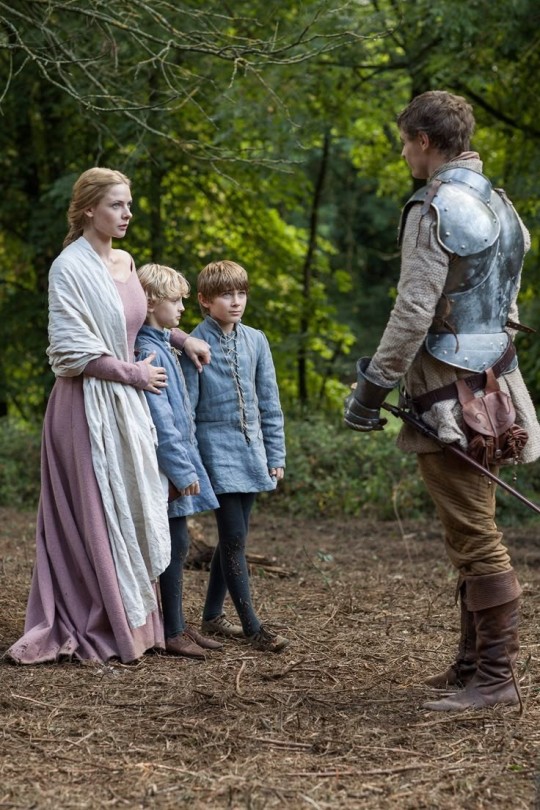
Adopted children, foster children and step-children will not have blood claim and therefore, in many cultures would not be permitted to inherit or gain any wealth or status not linked to their birth parent.
Step-Children are not entitled to any title even courtesy title of their step-parent. For example, if their dad is a Duke who married a Queen, they don't become Princess/Prince, they stay with Lord/Lady. They are not the children of royalty, they are the children of a Duke and they are not treated as Prince/Princess but they are still well treated as they are the step-children of the Queen. They will not inherit royal styles, jewellery and estates. This is the same for noble families intermarrying. Main rule is that whatever you are born as, you stay as - though this new marriage might give you some perks.
Adopted children are not entitled to titles, courtesy titles land and items linked to their adopted family. (This does not include children that are adopted by the title holder when they are next in line)
Foster children, as I explain in my guide about them, are usually in the family for a brief time usually just until they are of age and are entitled to only the basics which is their physical needs and educational needs. They do not inherit titles.
Unless...

However, this is not true everywhere. There are some cultures in the real world that do allow adopted, foster and step-children to inherit titles and lands through adopted, foster and step-parents. These cultures often allowed this in order to select the perfect heir chosen by the adoptee/foster parent/step-parent or to fill a gap when there was no legitimate heir in the wings.
Ancient Rome: The Romans had a system of adoption which a Roman nobleman or Emperor and even a Pleb, could adopt somebody in order to allow them to inherit. Emperor Augustus adopted numerous heirs, even his own wife. Often adopting members within the extended family or close allies, this allowed the adopter to chose the right person to inherit their wealth and styles, even over legitimate and blood-related heirs if they so wished.
Brehon Ireland: Foster children and the practise was a popular and important custom, which while preventing foster children from inheriting titles and lands from their foster parent, it made them equal in the eyes of the law as their foster siblings, with even foster parents entitled to avenge and protect their foster children from any harm.
Feudal Japan: Like the Romans, samurai families adopted male heirs to inherit clans, land and titles.
Byzantine Empire: It wasn't as common as in Rome but Byzantine emperors could allow stepchildren or even sons-in-law to inherit positions of power.
Ancient Egypt: Pharaohs of Ancient Egypt sometimes adopted family members in order to ensure there was a clear heir.
Ancient China : Adoption was rare but Emperors could adopt male heirs from within the family branches in order to continue the family line.
Sweden: In one extremely rare case, a French General of the name, Jean-Baptiste Bernadotte was formally adopted by King Charles XIII of Sweden. This entitled him to later become King Charles XIV John.
If You Are An Adopted, Foster Or Step-Child, You May Be Entitled To...

Some things. It's not to say that if your character can't be a prince or princess or gain a crown, they get absolutely nothing at all. In fact, if one of their parents marries a monarch or noble or they are adopted by a monarch or noble or they are fostered for a time, they will likely gain something.
Step-children can often be provided for by their step-parent, especially if one parent is dead and they live in the household. Step-children would not be allowed to inherit money that is linked to titles but they could still inherit some private wealth and items from their step-parent. Powerful step-parents may even see that their step-children marry well or access the same routes as their own children, such as educational or vocational avenues. Some royals even granted their step-children noble titles as shows of favour, such as Thomas and Richard Grey who by their step-father Edward IV, became Baron Astley/Earl of Huntingdon/Marquess of Dorset and Constable of Chester Castle/Constable of Wallingford Castle/Lord of Kidwelly respectively - along with numerous royal appointments and orders.
Adopted children, who are usually somehow related to their adopted parents but this is not always the rule, would be treated as their adopted parents saw fit which could be very well or with some difference than their legitimate children. Sometimes, they are adopted because they are next in line and the current holder of the title and crown has adopted them to educate them for their new role. But adopted children who are taken in are usually only entitled to have their basic needs met: food, shelter, clothes, education and sometimes help finding a match. They may even live somewhere apart from their adoptive parents but sometimes lived with their adoptive parents and were raised with their adoptive siblings.
Foster children are different. The foster system in the past was when a noble or royal family, took in a child from another noble family in order to offer them an education to groom them for their future. Foster children were often taken in in order to foster a good relationship between the families or to ensure their birth family would not act up. Foster children are expected to be treated well and given all privileges as their foster siblings but they can not inherit anything from their foster parents, that isn't privately accumulated wealth or items.
Difference in Inheritance

Not all things such as items and lands are restricted like titles and official seats of power. Anything privately acquired such as jewellery or private homes or private investments that are not linked to the wealth, property portfolio and power of the title can be left to a child that isn't of their body. For example, if a Duchess died and she had a son and a step-son, her son would be entitled to her title, her estates, the family fortune, the majority of her assets and her official jewellery while her step-son could be given pieces of her private jewellery collection, any property she held under her own name and any businesses she owned privately. This goes the same way for adopted or foster children - and is entirely at the discretion of their step/foster/adoptive parent.
#writing#writeblr#writing reference#writing advice#writer's problems#writer#writing resources#writing research#writing help#writing inspiration#Fantasy Guide to the Succession Rights of Adopted Children and Step-Children#ask answered#writing guide#fantasy guide#succession rights
195 notes
·
View notes